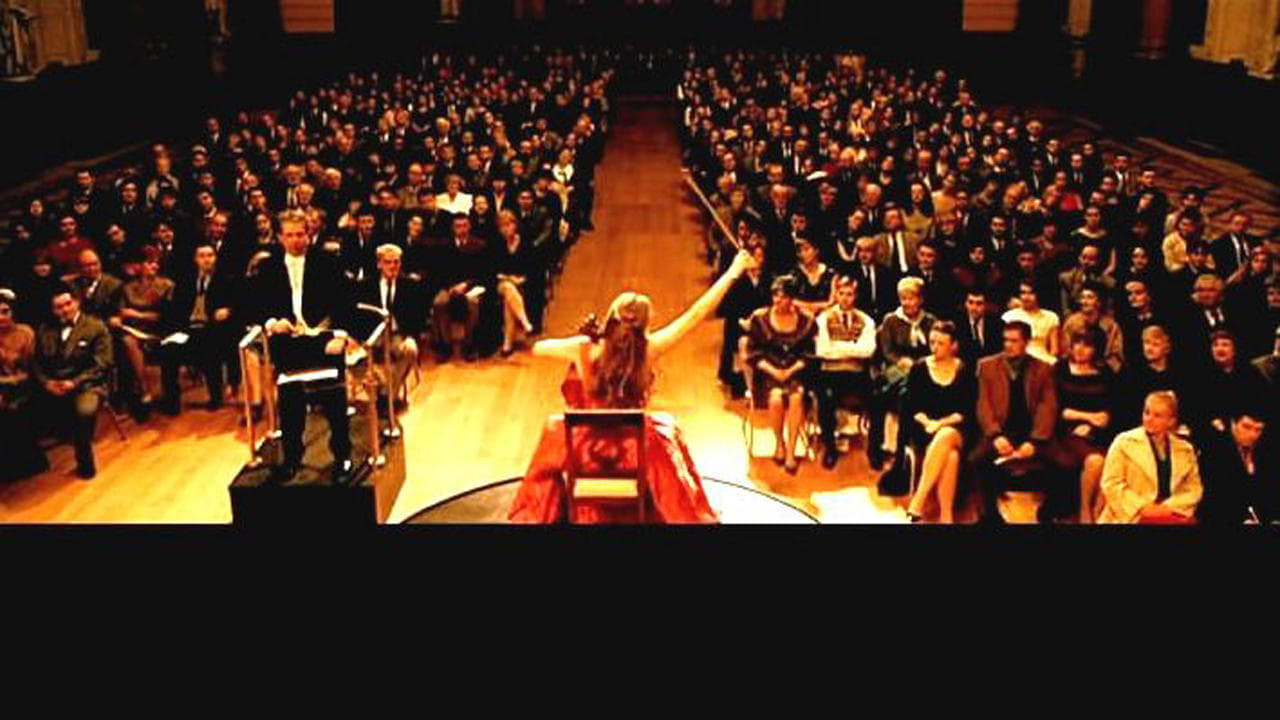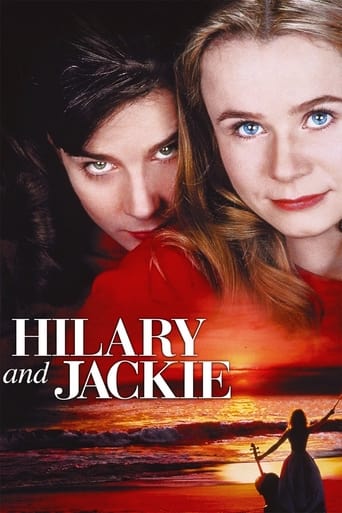

Terrible acting, screenplay and direction.
... View MoreSorry, this movie sucks
... View MoreThe movie turns out to be a little better than the average. Starting from a romantic formula often seen in the cinema, it ends in the most predictable (and somewhat bland) way.
... View MoreThis is one of the best movies I’ve seen in a very long time. You have to go and see this on the big screen.
... View More"Hilary and Jackie" is a film technically beautiful, with magnificent cinematography and music score and top-notch performances, highlighting the lead actresses Emily Watson and Rachel Griffiths. However the screenplay telling the personal life of Jacqueline du Pré from the perpectives of each sister does not work well. Jacqueline du Pré is depicted as a selfish and spoiled woman and it is impossible to the viewer to care to the character shown in the film. Consequently the film has no feelings despite the performance of Emily Watson and looks like a tragic soap-opera. My vote is six.Title (Brazil): "Hilary and Jackie"
... View MoreThe death of the cellist Jacqueline du Pré in 1987 was the cause of an unusually large amount of public grief and attention in Britain; the passing of a classical musician is normally marked by little more than an obituary in the broadsheet papers and possibly a brief item on the news. Du Pré, however, was someone the British had taken to their hearts. Part of the reason was her special relationship with the Elgar cello concerto, a work which has always played an important part in British cultural life; there may be room for disagreement with all three parts of the analysis, but at the time of her death I remember her being described as the greatest interpreter of the greatest work by the nation's greatest composer.The main reason, however, was the sheer tragedy of her life. She was a youthful prodigy who reached the top very early on; her famous recording of the Elgar concerto with Sir John Barbirolli was made when she was only twenty. Her marriage to the pianist and conductor Daniel Barenboim made them a Golden Couple, the Dick Burton and Liz Taylor of classical music. And then, while still in her twenties, she was diagnosed with multiple sclerosis. She gave her last concert in 1973 at the age of 28, after which her condition quickly deteriorated. By the time of her death aged 42 she had become paralysed and was confined to a wheelchair. The film was based on a memoir written by Jacqueline's sister Hilary and brother Piers and concentrates on the relationship between the two sisters. Hilary du Pré was also a musician, in her case a flautist, but was much less famous than her sister. Even so, the film pays them equal attention, being divided into two sections, the first telling events from Hilary's point of view and the second from Jackie's. Hilary was the older of the two and during their childhood and early teens was regarded as being at least as promising as Jackie. Eventually, however, it was Jackie who achieved greater prominence and Hilary seems to have given up performing as a professional after her marriage to Christopher Finzi, son of the composer Gerald Finzi. Such a scenario could easily have led to bitter jealousy and rivalry, but in this case appears not to have done so; according to the film the sisters were devoted to one another as children and remained so as adults, even though Jackie seems to have done her best to live up to the old stereotype of artistic geniuses as highly-strung, eccentric and temperamental. Hilary, who was probably not a genius, seems to have been much more placid and level-headed, which enables her to cope with her sister's foibles. When Jackie announces that she wants to sleep with Christopher, Hilary acquiesces, believing that this will help her sister's complicated mental state, and even persuades her reluctant husband to consent to this unorthodox "adultery as therapy" arrangement. Of the main actors I was least taken with James Frain as Barenboim, whom he plays with a heavy foreign accent; the real Daniel Barenboim speaks much better English than this. The others, however, are all much better, especially Emily Watson as Jacqueline and Rachel Griffiths as Hilary, both of whom were nominated for Academy Awards. Both lost, Watson to Gwyneth Paltrow in "Shakespeare in Love" and Griffiths to Judi Dench in the same film. In both cases I would disagree with the Academy; Paltrow's performance was not a particularly distinguished one and Griffiths' contribution is much more substantial than Dench's brief cameo. The two actresses seem exquisitely well suited to their roles, with their contrasting styles of acting- Watson's more demonstrative, Griffiths' more restrained- bringing out the contrasting personalities of the two sisters. An adjective commonly used about Elgar's great concerto- which we hear at several key points in the movie- is "autumnal", and the director Anand Tucker seems to be trying to reflect this in the look of the film. Autumnal tones- dark reds, oranges, browns, yellows- predominate throughout much of the film, and most scenes feature a prominent object in one of these colours, often Jacqueline's dresses. Only towards the end are these colours replaced by more wintry greys, whites and pale blues, indicating symbolically that Jacqueline's autumn has now turned to winter during a period of her life which should have been her spring and summer. The film ends with her looking back at her childhood, seeing herself and Hilary playing on the beach as young girls."Hilary and Jackie" was not perhaps the greatest film made in 1998; my vote for "Best Picture" that year would have gone to Peter Weir's astounding "The Truman Show". Nor is it perhaps the greatest ever film about classical music to my mind that must be Milos Forman's equally astounding "Amadeus". It is, however, beautifully written, acted and directed, a riveting psychological portrait of musical genius, of love, of loss, of sisterhood and of understanding. I am surprised that we have not heard more of Anand Tucker since. 9/10 A goof. The film implies that Jacqueline du Pré died during the night of the Great Hurricane, 15th - 16th October 1987- we even see that notorious forecast with Michael Fish denying that a hurricane was on the way. In fact, she died a few days later, on 19th October. This may, however, have been a deliberate change to make the story seem more dramatic.
... View MoreIn 1950s London, the real-life du Pré sisters--Hilary, a promising flautist, and Jacqueline, an animated, intense cellist--share an ordinary/extraordinary closeness. They are practically telepathic in their thoughts, yet a rivalry over their musical talents is always bubbling under the surface. This extends to their adult lives, as Hilary becomes a devoted wife and mother while Jackie flails away, alternately in contempt of the cello and yet attached to it as if by force. Jackie's neediness, which parlays into an off-putting promiscuousness, nearly breaks the sisterly bond, with Jackie desiring to 'share' Hilary's good-hearted husband. It is at this point in the picture that "Hilary and Jackie" becomes an unfortunate muddle of different melodramatic themes, yet the psychotic undercurrents of Jackie's behavior don't seem to set off any alarms on the screen. As flaky Jackie, Emily Watson (who resembles a young Susannah York) is focused and brave, but she is unable to help us reach this troubled soul (the built-in tragic story-arch doesn't help much, either). Rachel Griffiths has a far less showy role, however her character is one we can relate to (the grounded sister with a firm sense of responsibility). The film is extremely well-produced but, despite some dialogue or situations which ring false, the earliest scenes in the movie are best. It loses its way in the third act, becoming a tangled mess of sad episodes. ** from ****
... View More....a simplification perhaps,but not an absurdity."Hilary and Jackie" presents a version of the life of Miss Jacqueline Du Pre,an extravagantly gifted English cellist whose career and, ultimately, whose life was cut tragically short by M.S.It could have been a moving tribute to a considerable musical talent but it turned out as an exploitative sensationalist hatchet - job worthy of the sleaziest tabloid newspaper. The dreadful signs and symptoms of the final stages of Miss Du Pre's disease are graphically portrayed with the same glee as beggars once used to display their sores and deformities for the delectation of the public. In much the same way that "Lady Sings The Blues" salaciously bared Miss Billie Holiday's very private demons,so this movie is happy to desecrate the memory of a much - loved musician in the name of profit. No matter how good Miss Watson and Miss Griffiths are,they are still participating in a film whose only purpose can be to smear the memory of young woman who was revered by a generation of concert - goers. No amount of subsequent declarations of undying love from Miss Du Pre's guilt - ridden siblings can change that. All we are left with is some cello music that the unwary might think is played by Miss Du Pre.Don't be fooled - it isn't.
... View More